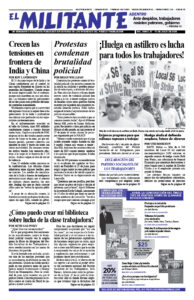The unity and fighting spirit of thousands of striking shipbuilding workers at Bath Iron Works in Maine is an example for workers everywhere as we seek ways to resist growing boss attacks on our jobs, wages and conditions.
Backed by the government, bosses are pushing to reopen factories, warehouses, retail stores and restaurants, while at the same time seeking to pare away “excess” workers to better be able to compete with their rivals and rebuild profits. Many are dumping workers, speeding up work for those who remain and showing utter disdain for workers’ safety on the job.
Workers are standing up and saying “No!” In addition to the Bath strikers, thousands of Amazon workers in Germany struck for two days beginning June 29 for a union contract, better pay and safer working conditions. Hundreds of Indian women garment workers laid off by Euro Clothing Company in Srirangapatna have been carrying out daily sit-ins in front of the factory since June 6 demanding their jobs back.
The protests against cop brutality that have swept across the U.S. and around the world both draw strength from, and help reinforce, workers’ determination to fight back.
Unemployment remains at levels unseen since the 1930s Great Depression. Some 1.5 million workers in the U.S. filed for unemployment last week, according to official figures, the 14th week in a row that figure has topped 1 million. An additional 728,000 filed for Pandemic Unemployment Assistance, a special federally funded program providing aid for self-employed workers, independent contractors and others.
The government says there are 19.5 million workers collecting unemployment and 11 million on the pandemic assistance rolls. These figures undercount the real numbers. Many have struggled to get through to unemployment office phone numbers and numerous others have gotten “discouraged” and given up.
Some of the government’s payouts are on the verge of drying up. The unemployment “stimulus” bonuses of $600 a week run out July 31. This will be another blow for millions.
Bosses getting ‘leaner and meaner’
Airline bosses — like those in many other industries — are reorganizing, shedding workers. Qantas management announced plans to lay off 6,000 workers and furlough another 15,000. Delta will furlough 2,558 pilots. Bosses at American Airlines cut jobs. At the same time they intend to redraw their flight schedule to assure every plane is “booked to capacity” starting July 1.
Airline manufacturers are following suit. Airbus bosses announced July 1 that they aim to cut 15,000 jobs. Unions in Germany — where 900 jobs have already been cut and 5,100 more are targeted — pledged to fight the layoffs and local protests have broken out.
“It’s going to be a mighty battle to save jobs,” said Francoise Vallin of the CFE-CGC, one of the unions organizing Airbus workers in France, where bosses say 5,000 workers have to go.
Macy’s bosses announced June 25 they are slashing 3,900 more jobs, this time largely from their white-collar staff. Smaller businesses, which employ half the U.S. workforce, are cutting jobs at the same time as they fight to reopen.
Competition between the bosses — and conflicts between rival capitalist governments that represent them — is intensified by decades of falling rates of industrial profit. The capitalist system is in decline and its sharpening antagonisms are undermining the “global world order” put in place after the U.S. rulers emerged as the victor from the second world imperialist slaughter.
Government debts are soaring to new heights as capitalist rulers everywhere try to “stimulate” their way out of the catastrophic effects of prolonged shutdowns. Political crises among them are sharpening worldwide as they seek partisan advantage.
Democratic Party politicians in state and city governments and their liberal supporters in the big-business press argue for more caution in reopening, maneuvering to pin blame for the effects of coronavirus on their rival, President Donald Trump. Republicans push for faster reopening, hoping an uptick in the economy will boost their chances in the November elections. Neither has the interests of working people in mind.
New York Mayor Bill de Blasio announced a new budget June 30 that slashes 22,000 jobs by Oct. 1 unless federal or state funds are forthcoming. Similar cuts are being announced in city halls and statehouses across the country.
While governments are accumulating debts, working people face threats over credit card, home, car, college tuition and other loans that they have no way to pay. Ditto for rents and mortgages.
The captains of industry are trying to reopen under the most favorable conditions to resume profitable operations — at workers’ expense.
Working people need to escape the demoralizing social isolation and get back to work under safe conditions. We need to link up in solidarity on the job to stand up to the bosses’ profit drive, aimed to get fewer workers to work harder for longer hours at less pay.
In face of massive unemployment, workers need to fight to build a labor-led movement to demand a government-funded public works program to create jobs at union pay, to build housing, hospitals, schools, child care centers, and rebuild crumbling infrastructure — all the things that toilers need.
Over 2,000 warehouse workers went out on a two-day strike at six Amazon facilities in Germany June 29. The e-commerce giant employs 13,000 workers there, its largest operation outside North America. Members of the Verdi union have been fighting for a contract to win better work conditions, including health precautions, and higher pay.
Amazon bosses — notoriously anti-union everywhere, like bosses at Walmart and most retail chains and the whole social media “industry” — continue their yearslong refusal to negotiate. Measures to offer more protection for workers, especially amid a spike in COVID-19 cases, such as slowing the line speed and giving each worker more space, would eat into the surge in their profits under government lockdowns.
Amazon bosses have also faced protests and job actions in France, Italy, the U.S., and elsewhere.
Deepening crisis in Latin America
In Latin America and the Caribbean, tens of millions face a deep crisis from the collapse of production and trade under lockdowns. A brutal sharpening of class inequalities is underway.
The countries there are still semicolonial, despite growing urbanization, and are heavily dependent on the export of mostly agricultural products as well as oil and other raw materials. According to the World Bank, they face the “worst crisis” in 120 years. The International Monetary Fund predicts an economic contraction in South America of 9.4% this year, sharper than projections for Africa, the Middle East or Asia. The major grain-exporting economy of Argentina contracted 26.4% in April, the worst monthly fall on record.
Two decades of economic growth has been lauded by defenders of capitalism as a new flowering of “emerging markets” — and a new investment opportunity for bankers, hedge funds and others with fat bank accounts. But this all began to contract years before the current crisis. For the ruling families in the region, 2015 to 2025 looms as a “lost decade.” For working people it’s a disaster driven by capitalism.
A wave of mass demonstrations has swept the region, from Chile to Colombia, fueled by anger at increasing government and employer attacks on working people. Protests demanded government action to reverse poor-quality public services, vanishing employment prospects and declining living standards.
Across South America and the Caribbean, 40% of the gross domestic product comes from street vendors and others in the so-called informal sector. With the absence of street life due to government lockdowns, many are in dire straits. No government “aid” reaches them. Among the Caribbean nations the halt of tourism is devastating.
In Chile, protests broke out in May on the outskirts of Santiago over inadequate food relief for the people hardest hit. In Brazil, protesters from Sao Paulo’s favelas marched on the state governor’s mansion demanding aid. In many cities across the region working people facing hardship have taken to banging pots and pans from their windows in protest.
Workers and farmers from the U.S. and Europe to the semi-colonial world have common interests and a common enemy — the bosses and their governments, especially in Washington and other imperialist centers. International solidarity is crucial.


